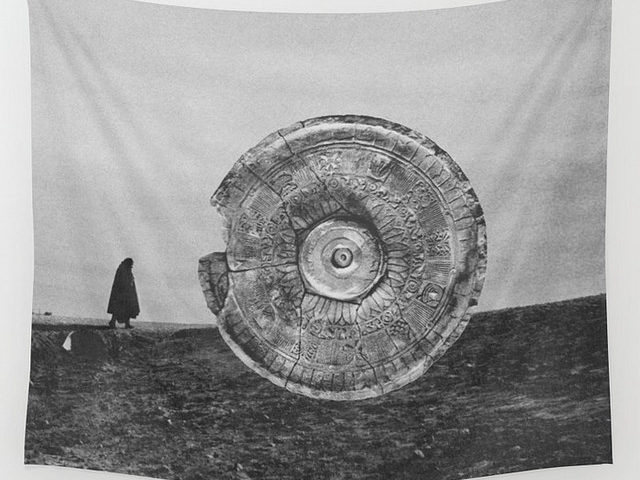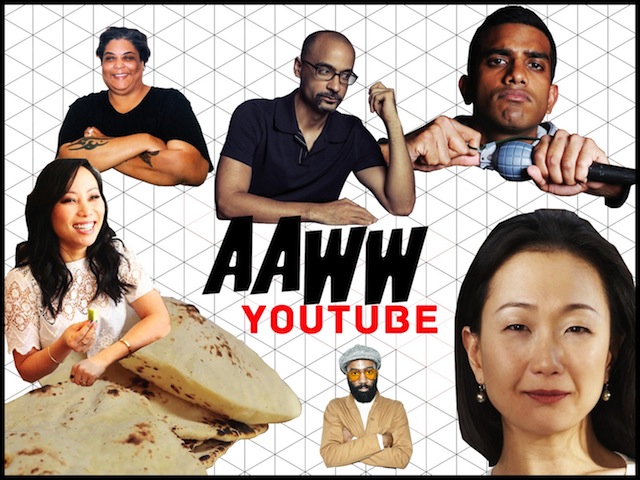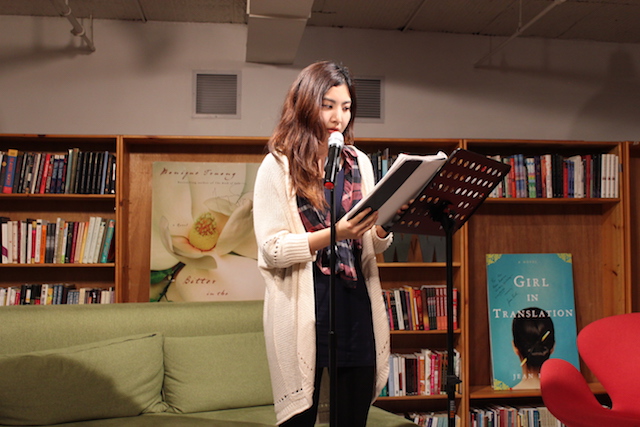Kimiko Hahn speaks on Asian American Acitivism; Kazim Ali confronts political grabs in poetry.

November 10, 2017
Last week we got cozy and sat down to have a conversation. Through the back and forth of dialogue, we delved into the nuances of past and present, writing about others’ trauma, and sharing personal experiences. This week, the weather grows colder and Halloween’s acceptance of everything beyond this earth and below it hasn’t yet left. We’re embracing the sociopolitical hellscape to dig in and uncover everything in the darkness and address it. It’s Scorpio season and we’re taking the time to listen to Yaeji’s moody new EP, dissect meme-monsters with Gabriel Winant, and Kimiko Hahn traces Asian American activism through the ages.
EP2 by Yaeji
Recently hailed as “house music’s exciting new voice”, Yaeji blends between pop, rap, and house to create a sound so much more interesting than all that plays in the club. The Queens-born artist goes back and forth between Korean and English in her songs to talk about anxiety, identity, and therapy in her new EP, a dark and moody set, with a distinct bass. For more Yaeji, you can hear her full Boiler Room set here.
Not Every Kid-Bond Matures by Gabriel Winant
So often we hear about Those Darn Millennials that we don’t stop to consider them a product of their own upbringing and social circumstance rather than, as Malcolm Harris describes in the newly released Kids These Days, creatures emerged “fully formed from the crack in an iPhone screen.” As Winant describes, kids these days have been highly scrutinized and structured to the point of their extraction from the normalized systems of society, which older generations stubbornly depict as passive entitlement rather than an active refusal.
From the preoccupation with bullying to the design of playgrounds and the school policy of zero tolerance, Harris finds the world of childhood increasingly redefined by actuarial caution. Most of all, though, he finds it in the classroom. School, after all, is just a form of unwaged work, masked by the ideology of pedagogy. The surplus that kid-labor creates, rather than going to any immediately present boss, pools up in the students themselves, to be tapped by future bosses. When they do schoolwork, children labor on themselves. “By looking at children as investments, we can see where the product of children’s labor is stored: in the machine-self, in their human capital.” The steady increase in homework, the growing apparatus of testing and school accountability, and the pressure for longer schooldays and schoolyears is just what you would expect once children have been turned into financial assets. Many of the observed social-psychological attributes of the young generation result from undergoing such processing into a human commodity-form. Childhood is a “high-stakes merit-badge contest,” teaching kids to be “servile, anxious, and afraid.”
Why Are So Many Monsters Hybrids? by Stephen T. Asma
The ways that human beings categorize the world around them comes into conflict in new surroundings—this coupled with anxieties of the new, creates mash-up monsters that are striking in their distinction from the ordinary. Asma goes further by using the threads of meme-theory being woven today to explain the hybrid haunting terrors.
Category violations strongly arouse the human mind. When our expectations about the world—“humans have two arms,” “snakes don’t fly”—are disrupted by Vishnu, with dozens of arms, or flying snakes in the form of dragons, the images grab our attention and become cognitively “sticky.” They stick in our memories, recall very easily, and spread throughout the social group. Hybrid monsters, in other words, make excellent memes. Richard Dawkins first argued that while memes were cultural fragments or cognitive units, they were analogical to genes in the sense that they spread through populations without conscious design or purpose. Unnatural ideas or images survive and spread well because they surprise us, making them harder to forget or ignore.
Peach by Kazim Ali
Acclaimed poet Kazim Ali speaks of the peach god in “Peach,” which weaves through natural themes to address the current political state of America. A gorgeous flow tracing movement and activism, the poem speaks to the rejection of President Trump and all that stand with him by the disjoined masses.
These sensate oceans open inside no one drowns no one has forgotten initial wombs when we breathed not liquid but ether
These shapes require no ablutions
Spring my third season own me
I am brought from the color blue from the color green I am most comfortable in pure abstraction
Pattern of rug etching in stone all the senators phone me
They want my vote, for the wind, for the sun
I propose the peach
What Do We Owe Kevin Spacey? by Alexander Chee
When actor Anthony Rapp accused actor Kevin Spacey of assaulting him as a minor, Spacey came out as gay in an attempt to deflect from his own heinous act and his weak apology (spoiler: it did not work). Chee discusses the politics of being in the closet and how Spacey can’t use his identity as a cop-out when his own personal history shows his distaste and violence towards the gay community.
Is he trying to use the gay identity he ran from for so long as a shield against the accusations that are multiplying across both mainstream and social media with each day? He isn’t, for example, proud of it, and being gay doesn’t seem to mean anything good to him. Our spaces were just a place he went to to feel famous and cruise for sex, and then, when asked about it, to mock us.
Why Nicholas Wong is ‘Resigned’ about Hong Kong Poetry by Karen Cheung
Nicholas Wong, noted poet, isn’t quite sure about Hong Kong poetry, nor is he quite sure of his own place in it. His lull in creation, prompted by the Umbrella Movement in 2014, has him wondering what his role is as the “spokesperson of queer writing in Hong Kong” and of how many think of him as the face of Hong Kong poetry.
Wong is hardly discreet about his love for the city. He grew up in the neighbourhood of Aberdeen, and has never lived outside of Hong Kong. During our hour-long phone conversation he fully demonstrated his fluency in local profanity. Last year, after he won the Lammys, he blurted out “Hong Kong add oil” in Cantonese before leaving the stage.
But in the face of the city’s political turmoil, Wong says he has considered relocating—then assured me, a rather alarmed fan, that it remains just a thought.
Thirty Years After My Adoption, I Found Out I Wasn’t A U.S. Citizen by Andrea Ruggirello
Right now, it’s all the more pressing to have all your papers in place. When Rugirello tried to apply for a temping job, her Social Security number didn’t place her as a citizen, she found that the system didn’t know she was one, even though her parents had adopted her with all the necessary paperwork filled out. Though she was able to confirm her citizenship, the experience left her thinking about her identity as a Korean-American adoptee and the broader scope of paperwork politics in Trump’s America.
That morning, before I drove from Morgantown, West Virginia to Pittsburgh, I had packed every form of identification I could think of: driver’s license, birth certificate, Social Security card, US passport, naturalization certificate. If I’d been robbed on the way into the office, I’m not sure how I would have proven my Americanness to the agent. Could I tell them about the time I wrapped care packages for soldiers on the anniversary of 9/11? The time my friend and I watched the Fourth of July fireworks at the edge of Boston Harbor? Or maybe I could tell them about all those cheeseburgers I ate at McDonald’s when I worked at the mall in high school.
A Refuge for Jae-In Doe: Fugues in the Key of English Major by Seo-Young Chu
Chu is set back into trauma memory by an ill-timed phone call from her alma mater. In a piece flipping between prose, poetry, and a hybrid of the two, Chu addresses rape trauma, specifically her own, and the subsequent fragmentation.
A yard, once used for some kind of sport, lies seemingly deserted. High above her, in a near-future sky, one allosaurus and one magpie, each the size of a skyscraper, battle for extinction. Crowds of invisible spectators flow toward the spectacle. At some point, when the rumors grow too poisonous, she turns around, against the tide, and starts to climb a secret staircase made out of wisteria, the stems of which twine counterclockwise. The more she climbs, more and more flowers surround her. Blossoms thicken. Petals seep into her hair. Her skin becomes liquid petal.
“Anyone is inside your house,” the flowers whisper.
“I don’t have a body,” she responds.
Angel Island: The Roots and Branches of Asian American Poetry by Kimiko Hahn
In a lecture to the Asian American Literature Festival, poet and distinguished professor at Queens College-CUNY Kimiko Hahn, traces a history of Asian American activism through poetry. Through the failures of American politics, she shares the forces that have stood in and alongside Civil Rights movements through poetry and activism.
We carved protest poems on the walls of our detention centers. We rebelled against the lunas in fields of volcanic-black soil. We protested when forced to live in horse stalls in the desert. When asked to serve the country while our parents suffered illegal incarceration, we said NO and NO. We also volunteered for the armed services to prove patriotism, forming the 442nd Infantry Regiment Combat Team, the most decorated unit in U.S. history and whose motto was “Go for Broke” (one was my Uncle!). We immigrated. We were born right here. We assimilated and we challenged the assimilationist paradigm. We wrote poetry.



